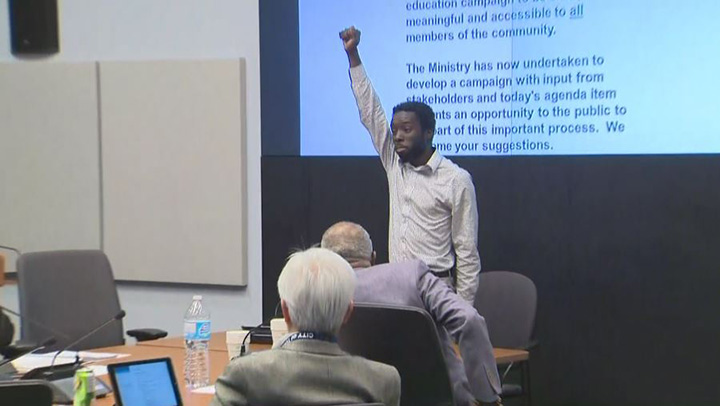The Toronto Police Services Board (TPSB) abruptly ended its meeting Thursday afternoon after journalist and activist Desmond Cole called for the elimination of police data collected through carding.

The Ontario government introduced new regulations on carding, or the random checks of people on the street by officers, earlier this year. As of Jan. 1, police are required to tell people they have a right not to talk with them, and refusing to co-operate or walking away cannot then be used as reasons to compel information.
“I come here peacefully with my words and with my intellect, and with the feedback of thousands of people in my community who want carding to actually stop,” Cole told reporters after the TPSB briefly suspended the meeting.
“This information is going to follow every single person who has been documented and that’s why it’s not enough for me.”
READ MORE: New carding rules approved by Toronto police board, historic data will still be retained

Get daily National news
After a 10-minute recess, the police board decided to adjourn the meeting for the day.
While speaking with reporters at Toronto Police headquarters after the meeting, Cole said he felt his message had been heard and that more needed to be done.
“I believe that I have to, and we have to, make change happen when it comes to this police board because they’re not going to do it on their own,” he said. “They’ve had years, so I don’t have any faith in them whatsoever or I would not be taking these drastic measures.”
LISTEN BELOW: Mike McCormack joins AM640’s Kelly Cutrara Show to discuss his reaction from Thursday’s meeting.
Global News reached out to Toronto police officials to follow-up on Cole’s delegation and request, but a spokesperson declined to comment.
Mayor John Tory’s office issued a statement after Thursday’s meeting.
“The Mayor is willing to listen to the public if they believe the safeguards in place are inadequate, however, little can be accomplished when a meeting is stopped and others are prevented from speaking,” the statement read. Officials added the policy adopted by the TPSB “appropriately restricts access to this data and increases accountability and transparency around its use” after it receiving “compelling advice” on the topic.
- Ontario lawyers applaud plan to boost legal aid eligibility, but say more help needed
- Teen dead, another injured in Ontario collision involving alcohol-impaired driver: OPP
- Toronto’s Max Domi fined US$5,000 for elbowing
- His body washed ashore near the Ontario-U.S border in 2003. Now, police have an ID
READ MORE: Provincial ban on carding criticized by community activists and police
Cole’s comments come after a report found carding does more harm than good. Critics argued it’s not enough that the board last month politely received the study it commissioned by two criminology professors.
“You should not waste any time thinking about the ‘public awareness’ of that regulation,” lawyer Peter Rosenthal said in a letter this week to the board. “Instead, you should refocus your attention on the report presented to you at your last meeting.”
In their analysis, University of Toronto professors Anthony Doob and Rosemary Gartner examine credible research around street stops to look at their broader impact. Ultimately, they conclude, the detrimental effects of carding outweigh its usefulness as a crime-fighting tool.
READ MORE: Toronto police being urged to ban ‘carding;’ critics cite analysis that practice is harmful
“One cannot conclude that something is effective just because assertions are made that it is,” Doob and Gartner write. “It is quite clear to us that it is easy to exaggerate the usefulness of these stops, and hard to find data that supports the usefulness of continuing to carry them out.”
Street checks started coming under intense scrutiny several years ago amid data showing officers were disproportionately stopping black and other racialized people. For their part, police argued they simply go where the crime is, and that stopping people ostensibly at random, asking for identification, and recording the information is useful.
READ MORE: Mental health, carding records can’t be disclosed in police record checks in Ontario
The issue, however, prompted the provincial government to enact a regulation this year that purports to ban race-based stops – except under certain conditions. Those conditions include cases in which an officer is looking for a particular individual or investigating a specific crime.
With files from The Canadian Press






Comments